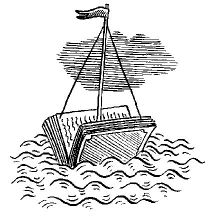The Book of Lost Books (18 page)


John Skelton
{1460â1529}
ERASMUS CALLED JOHN SKELTON “that light and glory of English letters,” the printer William Caxton praised his “polysshed and ornate termes,” and the universities of Oxford, Cambridge, and Louvain agreed, conferring on him the title of poet laureate. It is understandable that all these congratulatory encomia and admiring references went to his head.
In
A Ryght delectable tratyse upon a goodly Garlande or Chapelet of
Laurell,
Skelton considers his literary accomplishment. He is welcomed into the Court of Fame by Gower, Lydgate, and Chaucer. He modestly accepts their thanks for having made the renown of Britain “encrese and amplyfy,” even though it “welny was loste when that we were gone.” The Queen of Fame assures him that “by the preemynence / Of laureate triumphe, your place is here reservyd,” and asks Occupation to tell them “what Skelton hath compilid and wryton in dede” so that “we wyll understande how ye have it deservyd.”
What follows is an extensive list of Skelton's poems, prose works, and translations, which constitute the basis for his admission into the Court of Fame. Over thirty of them are lost, suggesting that his sense of his own importance to posterity might be somewhat elevated. His treatises on government
âThe Book of Honourable Estate, Good Advysement,
and
Sovereignty, a noble pamphletâ
presumably written when he was tutor to Prince Henry, have all perished. His play
Academios
and an interlude,
Virtue,
have vanished. We know little about his moral tracts
âHow Men
Should Flee Sin, The Book to Speak Well or be Stillâ
and less about his religious writings, such as
The False Faith
and the
Devout Prayer to
Moses' Horns.
What
The Ballad of the Mustard Tart
or
The Epitome of
the Miller and his Jolly Companion
or
The Pageants in the Joyous Garde
were about, we cannot know. His erotic
Repete of the Recule of Rosmundisbowre
has disappeared as completely, as has his
New Grammar.
Nonetheless, his vision ends with:
All orators and poetis, with other grete and smale,
A thowsande, thowsande, I trow, to my dome,
Triumpha, triumpha!
They cryid all aboute.
Of trumpettis and clariouns the noyse went to Rome.
Skelton gave his name to a verse form, the Skeltonic, a hasty, tumbling meter used for comical poems. He describes it in
Collyn Clout,
saying
For though my ryme be ragged,
Tattered and jagged,
Rudely rayne-beaten,
Rusty and mothe-eaten,
Yf ye take well therwith
It had in it some pyth.
Several of the poems that have survived are in this slight and sprightly form. “To make suche trifels it asketh sum konnyng,” he averred in the
Garlande of Laurell,
granting even the least of his writings a modicum of wit and skill. That he should now be best known for them, rather than his mass of panegyrical, theological, political, theatrical, romantic, and linguistic endeavor, would doubtless infuriate him.

Camillo Querno
{
fl.
1513}
WHEN GIOVANNI DE' MEDICI became Pope Leo X in 1513, he established himself as a patron of the arts and literature. He also intended to leave an architectural legacy, and his sale of indulgences to finance the rebuilding of St. Peter's precipitated Martin Luther's ninety-five theses, the foundation of the Reformation. His contribution to literary posterity was perhaps not as drastic, but was no less embroiled in bad judgment.
According to Paulus Jovius, who was made a knight by Leo as a token of respect for his history writing, one Camillo Querno had heard that the new pope was an aficionado of poetry. Consequently, he set out from his native Apulia to present his verse to the pontiff. Accompanied by a harp, he recited the twenty thousand verses of his execrable epic
The Alexias
to the vicar of Rome, who promptly made him his poet laureate, in reward for his brass neck rather than his golden tongue. The poem perished, but the poet enjoyed a certain notoriety.
Alexander Pope, in his
Dunciad,
compared the election of Colley Cibber as poet laureate to the ironic appointment of Querno:
Not with more glee, by hands pontific crowned,
With scarlet hats wide-waving circled round,
Rome in her capitol saw Querno sit,
Throned on seven hills, the antichrist of wit.
Querno's name was adopted at the end of the eighteenth century by an American Tory satirist, Jonathan Odell. Odell, who thought the American Revolution had been “a sort of insane phrensy, produced by the wicked few in administering to their victims this potion of political necromancy . . . this hideous hell-broth made up of lies, sophistries, ambitions, hatreds, hallucinations,” eventually emigrated to Nova Scotia and sank into the same obscurity as his pseudonym.
The infrequency of surnames beginning with
Q
offers Querno a mild afterlife in
Brewer's Dictionary of Phrase and Fable,
as an archetype of the untalented poet. We can surely be glad that if any book had to be lost, it was
The Alexias.

Luis Vaz de Camões (Camoëns)
{1524â1580}
WHAT DID THE gods have against Camoëns? The question must have burrowed and writhed in his mind more than once as he sat in Mozambique, penniless, racked with tropical illnesses, stranded, frustrated in love, blinded in one eye, having been shipwrecked once, exiled in chains to Goa, imprisoned twice, and recently robbed of his manuscripts to boot. That Ovid and Dante had suffered similar vicissitudes of fortune was hardly any compensation. It seemed as if nobody in his homeland of Portugal would ever realize he was their own, greatest epic poet.
Throughout his swashbuckling career, one factor remained constant: a poem called
Os LusÃadas
(
The Lusiads
)
.
In 1544, he was already being called the Lusitanian Virgil, on account of an episode he had written about the medieval Inês de Castro. Few suspected then that this was merely a part of a much grander conception. An unfortunate love affair with the queen's lady-in-waiting led to temporary exile from Lisbon, and Camoëns signed up as a soldier. The depredations of war rendered him quick-tempered and imprudent, and a brawl in 1552 led to his imprisonment. He was pardoned by the king, with the proviso that he leave for India and the colonial service.
In 1553, on the
São Bento,
bound for India under the command of Ãlvares Cabral, he safely rounded the Cape of Good Hope. These storms and tempests would eventually be integrated into his epic poem. The Cape, he imagined, was not just the Cape, but the Giant Adamastor, who forbade vessels to pass. He had left with the words of Scipio Africanus stinging on his lipsâ“Ungrateful fatherland, you will not be allowed to hold my bones”âbut was already understanding that the real heroism of the Portuguese was not in archaic glories and half-fictitious founders lost in the mists of time, but in the explorers and navigators who triumphed over the all-too-actual weathers of the present. He was sailing into the realms that Vasco da Gama had opened less than fifty years beforehand.
His trading prospered in the Orient, though his temper still caused grievances. In 1559, however, events took a turn for the worse. The boat that had been transporting him back to India from China sank at the mouth of the Mekong River, and he did not save the papers necessary for his impending trial (for threatening the settlers in Macau), nor the wealth he had accumulated. What he did rescue was
The Lusiads
to date: seven complete cantos. A sheaf of dampening paper and bleeding ink, and it survived.
He decided to return to Portugal, but soldiers had to pay their own fare back. In 1567 Captain Pedro Barreto took the poet as far as Mozambique, but with no more money, refused to take him further. With no means to pay another captain, he spent three years marooned on land, impecunious and frequently ill. He wrote a work called
The Parnassus of
Camoëns,
described by the historian Diogo do Couto, who knew and supported Camoëns there, which was stolen. It was, apparently, “of much learning, doctrine and philosophy.” But the thieves did not find
The Lusiads.
Camoëns eventually escaped from the African coast and returned to Lisbonâtypically, during a plague.
The Lusiads
was published: an epic, not about fabled origins and distant triumphs, but of the present. It was not arms and the man, but trade and the empire: a poem in which the gods of Greece vainly attempted to confound the destiny of Vasco da Gama. Bacchus and Cupid and Jupiter were merely personifications who either helped or hindered the manifest destiny of the world-spanning, Catholic Portuguese. Dionysus, Neptune, and the classical pantheon were deployed only to fail in obstructing the determined prow of the now. It was the last attempt to use the gods of Greece and Rome as if they were actual beings.
It was praised by the poet Tasso, who sent a sonnet in congratulation; but Camoëns died in poverty anyway. He had ended the poem with a vision of the harmony of the spheres, where Portugal, at the edge of Europe but nonetheless at the center of the universe, was the pivot of reality. He bitterly remarked of the governance he found on returning that he was so patriotic he would not only die in his country, but with it.
Copernicus had already levered the earth from the center of the universe. Cervantes was about to inject irony into chivalry, nobility, and heroism. Shakespeare was hesitating toward his first, faltering attempts at drama. As Camoëns died, a world died with him. Had the old classical gods, crumbling in the face of modernity, preserved the last poem to invoke them in all their power and grandeur? If so, they would be disappointed by the result. Camoëns, the bard of spice routes and treaties, of an emerging capitalist era, had ultimately shown them up as the tattered stage props they were: broken, unlikely, fallen, and absolutely irrelevant to destiny.
The Parnassus of Camoëns
was lost in Africa, but
The Lusiads
guaranteed Camoëns's place in the actual Parnassus of geniuses.

Torquato Tasso
{1544â1595}
IT IS HARD to understand the ebullience of Charles Lamb, who, on acquiring a copy of the 1600 translation of Tasso's epic poem
Jerusalem
Delivered,
or
Gerusalemme Liberata,
scribbled to Coleridge, “I have lit upon Fairfax's
Godfrey of Bullen,
for half-a-crown. Rejoice with me.” The poem, which recounts the Crusaders' siege of the Holy City under the leadership of Godfrey of Boulogne, was ranked alongside
The Iliad
and
The Aeneid
by no less a poet than Milton. Dryden thought Tasso was “the most excellent of modern poets . . . whom I reverence next to Virgil.” He was translated by Richard Carew, Edward Fairfax, and even more minor writers (Henry Layng, Philip Doyne, John Hoole, J. H. Wiffen, J. R. Broadhead, and a plethora of vicars with nothing better to do) who now languish in similar obscurity. One looks in vain for a smart paperback of Tasso in any airy, coffee-scented modern bookshop.
Torquato was born in Sorrento, near Naples, in 1544, the son of Bernardo Tasso, a noted poet of his day and, at the time, the secretary to the prince of Salerno. The vacillating alliances and shifting allegiances of the period were hardly conducive to domestic tranquillity: by the time he was twenty-one, the young Tasso had been shunted between Rome, Ravenna, Venice, Bologna, Mantua, and Padua. His legal studies at Padua were punctuated with amorous attachments, scurrilous verses, barroom brawls, and the study of Aristotle's
Poetics.
He left in 1565, adamant that he would not practice law, to join the household of a family that would have a dramatic, and not always beneficial, impact on his future: the d'Estes of Ferrara.
The political turmoil of Renaissance Italy took its toll on his father's writing, in a manner that would be echoed in his own literary career. Poetry was a potent tool of diplomacy, a courtly arena where panegyric could lead to patronage. As a teenager, Torquato had helped his father transcribe revisions to his epic poem
Amadigi,
based on the romance
AmadÃs de Gaula.
He would have been made clearly aware of the value of flattery in his father's shift of emphasis in the subtle contemporary allusions away from the French and onto the Spanish, who were allied to Bernardo's benefactors.
There were aesthetic as well as pragmatic changes to consider as well. The most lauded modern poem was Ludovico Ariosto's
Orlando Furioso,
a mammoth entertainment of chivalrous knights, magical steeds, and anthropophagous ogres. Published in 1516, it continued the story of Orlando and Angelica, which had been so successful for Boiardo in his unfinished
Orlando Innamorato.
Even after Ariosto's death, the poem continued to grow in popularity, and size, enlarged from forty to forty-six cantos in 1532, and gaining another five cantos after that. It was irregular, ironic, and cautiously irreverent.
With the resurgence of interest in Aristotle's lectures on poetics, however, literary critics were now seeking a different kind of epic: a single hero and a single action, a poem of elevating moral principles. Ideally, it should express the very quality which Ariosto had become celebrated for shunning: serious virtue.
Bernardo Tasso was torn between these models: Aristotelian seriousness and Ariostan jollity. All previous attempts at the high heroic style had been greeted with indifference. Even the classical
Amadigi
required “the variety which pleases,” he capitulated. Torquato claimed his father had written at least part of an epic following the Aristotelian strictures: at a public reading, it emptied the hall. The text in question is lost.
Torquato Tasso's ambition was to succeed where his father had failed, to unite the charm of Ariosto's work among readers with the rigorous classicism demanded by the critics of his day. Throughout his life, the fear of public failure, anxieties about critical dismissal, and political expediency blighted Tasso's well-being. He was prone to paranoia and quick to take offense. While still studying at Padua he had drafted a work on the Crusades under the title
Rinaldo.
He abandoned his creative work, resuming instead his study of the theoretical principles of epic poetry. But his aim was now fixed: he would write an epic. Well, to be honest, like most young men he wanted fame, acclaim, and money; and uniting classical and modern traditions in one work seemed a feasible way to acquire them.
In 1579, fourteen years after entering the service of the d'Estes, the “madman” Torquato Tasso was in their dungeon. Tradition has it that the reason for his incarceration was an imprudent amour with Duke Alfonso's older sister, Leonora. Although the image of the shackled, lovelorn poet was to inspire Byron and Goethe, it is pure fabrication, a fantasy of later biographers, and makes little sense given the nature of court life. Suppose Tasso were having an affair. He would most likely have ended up like Count Ercole Contrari, strangled on Alfonso's orders for his dalliance with Leonora's sister Lucrezia.
Tasso had been on good terms with both the sisters, and read parts of the embryonic poemâthen called
Gotifredoâ
to them. According to Milton, Tasso offered several different topics for the epic treatment to Alfonso; luckily, the duke chose the very one on which Tasso had already been working: the
Rinaldo
abandoned during student days. He had also written a pastoral drama for the d'Este sisters, entitled
Aminta,
and undertaken a diplomatic journey to the court of Charles IX in Paris, with the duke's brother, Cardinal Luigi d'Este. So why was he kept chained, in solitary confinement, in the “hospital” of St. Anna, for seven years?
Call it a surfeit of melancholic humor or an imbalance of endorphins; call him bipolar or possessed: whatever caused it, something was wrong with Torquato Tasso. His letters are full of imagined slights and malicious conspiracies. The doctor is trying to poison him. The servants are untrustworthy. Nobody appreciates his genius. He has no genius.
Other courtiers were more than concerned by his habit of surrendering himself up to the Inquisition. It was as if he gained some momentary equilibrium, after he unburdened his anxieties about heresy and catalogued the sins he might have committed, and the priest, scrying into the corners of his soul, pronounced him forgiven. Like a caricatured contemporary novelist, he relied on the closest thing in the sixteenth century to a shrink. But in the gossipy, secretive world of a Renaissance court, Tasso's compulsion to confession was a dangerous liability.
This need for perpetual reassurance can be seen in his manner of composition. As he wrote each of the cantos of the poem now called
Gerusalemme Liberata,
they were sent to his friend Scipione Gonzaga, a prelate in Rome. He then circulated the manuscript among a coterie of trusted advisers: Pier Angelio da Barga, the Latin poet; Flamminio de' Nobili, a scholar of Greek and philosopher; Silvio Antoniano, a professor of eloquence; and Sperone Speroni, the renowned literary critic. They wrote back with comments on the polish of the verse, how well the poem followed the various dicta of Aristotle and other critics of antiquity, and whether the epic was in line with the teachings of the church.
They provided orthodox precedents for the use of guardian angels and demons to replace the gods of Homer and Virgil, and made notes on the allegory, the moral and scriptural interpretations of the poem. They offered advice on how best to blend the contemporary chivalric love elements with the martial splendor of
The Iliad.
From the theology of the efficacy of prayer to the most minuscule points of probability, the elite group of critics suggested alterations. Tasso made numerous changes, then burned every scrap of the copious correspondence from the poem's intellectual regulators. When the poem did appear in print, it would be unimpeachable.
Tasso's behavior became markedly more erratic in 1576. It is tempting to think that the trigger, if not the cause, was the publication of a pirated edition of the poem; a breach of trust that must have seemed like confirmation of his worst paranoid delusions. By the summer of 1577, Alfonso had him under house arrest, under the care of a physician and a priest. Tasso escaped, and traveled in disguise to his sister in Sorrento. He left behind the manuscript of the poem.
The d'Estes would not have him return to court; nor would they return the manuscript of
Gerusalemme Liberata.
Over the next two years, Tasso drifted back to his old haunts in Mantua and Padua. He attempted to sell his services to the unimpressed Medicis in Venice. He even trawled around the minor courts in Pesaro and Turin. Eventually, on condition that he display some restraint, the d'Estes allowed him to return. He had barely arrived when he flew into another temper at some supposed snub, and was dragged to St. Anna. Fearful that he might destroy the manuscript, Alfonso d'Este refused to allow him to work on the poem.
In the age before copyright, the author's intellectual property was never too nicely observed anyway. When the author was a certified maniac in a prison, pirated editions appeared apace. Despite the fact that the copies were riddled with errors and set from uncorrected manuscripts, the
Gerusalemme Liberata
was an immediate success.
It was such an indisputable cultural phenomenon that it soon evolved into a full-blown contretemps, with critics divided between Tasso's supporters, the so-called
Tassisti,
and the
Cruscanti,
who took their name from the Accademia della Crusca, and preferred Ariosto. From St. Anna, a torrent of letters carried complaints about Tasso's involuntary and unjustified imprisonment and his cheating and slapdash publishers, to anyone who listened.
In 1586, Tasso was released into the care of the duke of Mantua. If the duke was expecting to set himself up as a patron of the arts, however, he must have been sorely disappointed. Tasso dredged up and completed his bombastic tragedy,
Il Re Torrismondo,
failed to appear at his scheduled lectures on Aristotle, and left for Rome, fulminating against the d'Estes.
The rest of his life was a melancholy transit from court to court, and patron to patron. He wrote panegyrics for Pope Gregory XIV and genealogies for the Gonzago faction. He died in Rome in 1595, before he could complete an encomium on his latest doctor.
Before he died, Tasso tried again to recapture his lost book: the poem in his head, which had only been manifested in debased, erroneous, and misbegotten versions.
Gerusalemme Conquistata
(1593) incorporated many of the revisions he had originally been sent by his clique of collaborators. It expanded the poem's length by four books and renamed many of the principal characters. It is, by any reasonable definition, a different poem. The public, and the critics, preferred the earlier version.
Undeterred, Tasso wrote two books justifying his later version, in terms of its historical accuracy and allegorical import (a further book on its technical and stylistic superiority was advertised, but never appeared). The poem also altered any subtexts complimenting the d'Estes, and transferred his affections to his new patron, the prince of Conca.
Even after the publication of
Gerusalemme Conquistata,
Tasso wrote to his friends about corrections, improvements, and alterations he believed were necessary. In the end, because of the endless revisions and changes, there can be no “definitive” version of the poem. Given Tasso's psychological instability, it is unlikely that any rewrites could have finally fixed his aesthetic intentions.
In a late letter to Barezzo Barizzi, dated May 15, 1591, Tasso suggested that the extant epic is, in fact, only half of his projected work. He hinted at a sequel, which would stand in relation to
Gerusalemme Liberata
or
Conquistata
as
The Odyssey
did to
The Iliad.
Certain episodes from the original version were to be cut from the revised version (such as the love plot between Sophronia and Olindo, on the grounds that they were “too romantic”). Could they be reintegrated into a more picaresque successor?
Would the sequel, like
The Odyssey,
describe the homecoming of the heroes? Not for Godfrey of Boulogne, the central character, who died of the plague in Jerusalem. In several letters in that month, Tasso asked friends to send copies of Dionysus of Halicarnassus'
History of Rome,
and Lucian's satirical novellas. Was he collecting material for a new poem, or establishing facts for his self-justificatory prose work?
“Everyone, we suppose, who reads at all, reads Tasso; has contemplated with delight the immortal productions of his Muse,” said the
Eclectic Review
in 1810. The sentiment seems immeasurably distant two centuries later. All we do know for certain about Tasso's never-written sequel is that, even if he had had the chance to write it, very few would now bother to read it.
